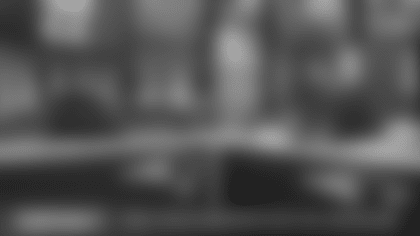Q: When you travel to a new stadium that you've never coached in before what is one of the first things you'll do upon arrival to get a feel for a new surrounding?
BB: Yeah, really Mike [Reiss] I think it's the same every week whether you've been there or not. Of course if you haven't been there [then] there is a newness to it, but even if you have been there at most you're probably playing in that stadium once a year. So just re-familiarizing yourself with the conditions, the sun, the lights, the scoreboard, the 40-second clock. I would say in most of these stadiums, the way they're built, there's a difference in the wind between in the end zone where it's more protected and out at midfield and usually the flags are no indicator of anything other than it's the opposite of whatever they are. The turf, the footing, the consistency of that, if cleats are an issue. [If] it's a turf field then obviously it's not the case, but if it's not then what are the conditions? Cleveland's surface versus, let's just say Arizona's surface - I mean, they couldn't be more different. So each game is different so even if you've been in the stadium before, if it's a day game, if it's a night game, whatever the wind is, whatever the sun is, it's different for that day. I think fundamentally you just always want to go through that process and re-acclimate yourself to the specific conditions for that particular game.
Q: Sometimes the cameras will catch you and the staff walking the field hours before kickoff. Is that what you're doing during that period, evaluating the stadium conditions?
BB: Yeah. Yeah, sure. You can get a feel for that then and then I'd say in pregame warmups, you know, again depending on the conditions, but I always talk about the kicking game because the wind will affect the kicking game more than it will affect the passing game. But then how does that affect our overall field goal range, four-down situation, directional kicking, so forth. Walking around is one thing but actually going out there and kicking the ball or throwing the ball is a little bit different. I'd say you have a better gauge on it after pregame warmups. So we kick first so that's the first part of pregame warmups and then we do the rest of it. Maybe if the field is slick in terms of cutting and running certain routes, maybe it's a certain area of the field like we have to be careful of running comebacks on the sideline. We don't want to fall down and throw a pick-six or something like that, so you know, it's just things like that.
Q: Do you ever take a look at the grain of the turf as far as which direction it may be cut or if there is any kind of slickness to the way it is laid out?
BB: Yeah, I'd say through the years there's, you know, I mean things have changed a lot through the years, but yeah, there's some fields that definitely have a slickness to them, if you will. And that could be the way it's cut or whatever, rolled, or whatever they do. Some fields have a softness to them. We're not dealing with this anymore but even not that far long ago was the whole infield situation in Miami, whether it's sodded or infield or whatever, but that was definitely a factor. Like in those games we always tried to in the fourth quarter be kicking on the non-infield end, regardless of what the wind was, as an example. So again, that's something we've got to deal with. The seams and so forth, you know, those old fields like Veterans Stadium that were baseball fields where they would take out the pitcher's mound and put in a square of turf that they would inlay in there, whether there's some bad seam areas in various spots. I mean, definitely players were aware of that. I mean, they're not looking at it; they're playing. But there's some awareness of it. The end zone, a lot of times the sidelines when you have a multi-purpose field there are multiple markings out there. We had that when I was in Denver in the old Mile High Stadium where the Denver Bears played. The first-base line ran not quite parallel to the sideline and so it was lighter but you could still kind of see it and the way it was cut it was clearly there but the sideline was a little bit further. I remember we had a couple of plays out there, one in particular, where a runner thought he was out of bounds and he was still in bounds and he got hit and it was a yard sale; helmet, ear pads, chinstrap. Each stadium has their own little idiosyncrasies and uniqueness.
Q: Obviously getting rest for the players at this point of the year is important.
BB: It's important to the coaches, too.
Q: Going coast-to-coast like this, what kind of advantages are there to leaving on a Friday and getting there a day earlier than normal?
BB: Yeah, I mean there's different ways to do it. In the end, I think the most important thing is to be prepared and play well. I think that overrides all the other things.
Q: You've done different things in the past though regarding travel situations for road games though, correct?
BB: Yeah, it was based on the schedule. It's based on where you're playing, when you're playing, what the other circumstances are. Sometimes the options are maybe not endless based on whether it be the hotel, or the airplane, getting a bigger plane for a longer trip. Maybe those aren't available 24/7. I mean, there are other factors that go into it. Again, each trip has kind of its own characteristics so I don't feel that there's just like one way to do things that we've got to do it this way if we're traveling here or traveling there. As much as we can we try to stay in a routine.
Q: Do you plan all of that months in advance or is that something that's determined the week of the game?
BB: [If] you try to change your travel plans in a week you're trying to ship, whatever it is, 200 people out to wherever you are; players, coaches, staff, marketing, equipment, everything else, what the FAA regulations and so forth [are]. I mean, you can't just throw whatever you want on an airplane now. You've got weight requirements, you've got packing requirements, things like that. There are things that we did years ago, even as little as a couple of years ago, that we can't do anymore. A lot of times we truck our equipment to the away sites. That's definitely not the plan this week, but again, there are issues with smaller planes, and weight, and cargo, and baggage, individual player baggage. Look, we're moving a lot of people here. Now that's something I think you can do - now look, every once in a while something comes up. Like when we played Pittsburgh in the AFC Championship Game [in 2004] and we had the snowstorm we left a day early and went up there. You see what your options are and make the best of them. Sometimes there's availability and sometimes there isn't, and then you figure out what the next best thing to do is. But no, we're not in an environment where whatever we want to do, 'OK, let's do that.' There are a number of hoops to jump through.
Q: I've heard the phrase that availability can sometimes be as important as ability.
BB: Dependability is more important than ability.
Q: Yes, I believe that was the phrase.
BB: Yeah, I agree with that.
Q: What have you noticed from Tom Brady in that regard and the fact that week after week, regardless of the hits he takes, he can just brush it off and say 'I'm ready to go this week'?
BB: Yeah, very impressive. I mean there are a lot of great qualities that Tom [Brady] has. That's right at the top of the list, and it's not only his - certainly it's important for him to be physically healthy - but it's very important for the team on a weekly basis to be able to go out there in practice and get the timing with the quarterback who's going to play in the game with the other people - the linemen, the receivers and so forth - that are going to play with him. So if you're missing one receiver then maybe you can get the timing with the other 10 players, let's call it. If you're missing the quarterback then, you know, you can still get it and certainly we have a good quarterback in Jimmy [Garoppolo] and Jimmy can go out there and run everything that Tom can run. We've seen that, so I'm not saying that he's not capable or qualified to do it. He is, and he does a great job of it and when we put Jimmy in there it's really seamless. Unless you were actually looking at the position, if you just could block out that positon and say which guy was in there at quarterback, I don't know if you would know a lot of times. For the quarterback to have that kind of consistency with the snap count, the cadence, the way that his voice or mannerisms or reminders are in the huddle, little things like that, the whole timing and everything on the line of scrimmage and running the plays in practice; that is a huge carryover to the games. Again, Tom's consistency to do that, again, not only for himself but for the rest of the team and the ability for the rest of the team to be able to have been able to count on that is very important.
Q: Older quarterbacks in the past have noted more difficulties in day-to-day preparations than playing games. What stands out about the fact that that doesn't seem to be the case with Tom Brady?
BB: Yeah, it definitely stands out. Tom [Brady] works very hard on his physical conditioning, recovery, rest, and so forth. It's really 24-7, 365 days a year. Every day here's here, I don't know if it's 365 days a year, but every day I see him, he's doing those things. He's not just in here to put in time. He's in here to work on his training, work on his conditioning, work on his recovery, get treatment, do whatever he can do to physically maintain or improve where he's at. So absolutely, it's a daily - multiple times a day - it's a daily thing for Tom.
Q: Looking at the identity of this team at this point in the season, do you think this team needs more swagger, more of an edge than it has right now?
BB: Yeah, I don't really know what that means, so I can't answer the question. I'm just trying to win games. I'm not trying to create, I don't know, I don't know what the identity is. The identity I'd like to have is a team that wins a lot of games. We've had some of that around here, so I'll take that rather than being known as a, 'this kind of team' or a 'that kind of team.' I think if you're a smart, tough football team that wins games, that's what you want to be. The rest of it, I don't really know what that means.
Q: What can you say about Cyrus Jones's development as a quarterback?
BB: Cyrus [Jones] has worked hard. Yeah, he's worked hard. He's had, as you know, when you're working with the scout team, a lot of times, that's a better opportunity to develop as a player than working not on the scout team because you're working against our best players doing the best things that they do. You're seeing our best players trying to run our offense and you're out there on the scout team trying to cover it or defend it as the case might be. That's a great opportunity to improve for practice squad players or scout team players, and that balances with the players who are playing trying to execute the plays that they're going to have to execute on Sunday to win. I would put him in the same category as a lot of other players in that they work very hard on the practice field to improve their individual skill and their craft and that's a good, great time to do it; a great place to do it, to work against our best players at the complementary positions, so he's done that.
Q: Can you recall anyone specifically throughout the years that's really improved through those scout team reps?
BB: All of them. [Julian] Edelman, [Tom] Brady, [Ryan] Wendell, Steve Neal - Steve Neal didn't even play football. I mean, they don't just grow on trees. There's a process in all the guys. Dan Connolly. We had many offensive linemen that weren't even on the team for two or three years and then they - Wendell. I don't think he was on the team for three years and then he ended up starting for us. Steve Neal couldn't even find the field but was a good football player, but it was a process. Julian was another guy. He played three positions he had never played in college, and hasn't played the positions that he did play in college. I could go on and on. That would be a long list.
Q: Is there a balance between players expecting a lot from themselves but also not beating themselves up if things don't go the way they expect them to go?
BB: Yeah, I think that's the sweet spot that every player wants to be in - expect a lot, expect a high level of performance. It's a very competitive league. It's hard in this league; you just don't go out there and win 53-0 every week. It's impossible. The other teams are too good. We go out there, we all make mistakes, we all have plays that we wish we could have over again, or do better on, or calls, whatever the case might be. You kind of regain your balance after those and do it again and try to do a little bit better the next time. You don't lose your confidence, but the next time you go out there and have a high expectation, a high level of commitment to perform to the very best of your ability. Inevitably, you always come up a little bit short, nobody plays a perfect game. Then you live with those, whatever the level of disappointment is, whether it's one percent or maybe it's 50 percent, whatever it is, and then you don't lose your confidence. You go back, correct the mistakes and turn the page and move forward. I think that's where you want to be, yeah. But sometimes it's hard. When you're disappointed and you put a lot into it, those games that you lose, if you put a lot into a particular situation and it doesn't work out well, there's obviously a high level of disappointment, which there should be if you put a lot into something and it doesn't work out well. You're not just going to walk away and say, 'I don't care.' When you say you don't care it's when you didn't put anything into it, because you really don't care. So whatever happens, you just live with it. But yeah, the ones you put a lot into and they don't work out, it's harder to get over those. But that's what we all have to do.
Q: How important would you say the quick release is to your offense? Would you say it's something that's been talked about more in years because of the advanced metric websites, or has it always been there?
BB: The, what now?
Q: The quick release, quarterback release.
BB: What metric are you talking about?
Q: The advanced metric websites that put emphasis on quick releases by quarterbacks.
BB: What is that? I mean, you could take those advanced websites and metric them - whatever you want. I don't know. I have no idea. I've never looked at one. I don't even care to look at one. I don't care what they say. As far as a quarterback goes, read the coverage, throw the ball to the open receiver and take the best matchup. That's what it is in a nutshell. The quicker we're open, the clearer the picture, the sooner the ball is going to come out. If we don't have anybody open, who is the quarterback going to throw it to? It's timing, decision making, execution by the entire offensive team. That's what the passing game is. The receivers have got to get open and catch the ball. The quarterback's got to read the coverage, make the right decision and make an accurate throw. All the metric pages and all of that, I mean I have no idea. You'd need to ask that to a smarter coach than me.
Q: When you're talking about player availability and you're making a long trip, is that going to affect the timetable of evaluating whether or not a player is going to be ready to go and make the trip, or does that have nothing to do with it?
BB: No, I think it could have a lot to do with it. It would depend on what the player's individual situation was. It's certainly a lot different than being at home where you could literally wait until an hour and a half before the game and make your decision on the player. I don't think there's a lot of downside. We've certainly had discussions in the past if the player has, whatever his particular condition is, if we think it's probably less than 50-50 that he would be able to play. Again, if we were playing at home it would be a bit of a different situation. If we feel like it's probably a long shot if you will, then do we really want to put him on the plane for five hours? Do we really think that after all that the swelling is going to down or that the 'whatever' is going to loosen up or whatever the case, whatever the nature of the condition is, is really going to improve? Is that the best thing to do, or the right thing to do? And could it set us back, and now we come back after the game, let's say the player either does or doesn't play, and then here we are on Monday and we're further behind than we were on Friday. Yeah, I think that's a legitimate conversation. Again, it would depend on the individual player's situation and I think it would have a little more effect on a trip like, like a west coast trip than if we were going to Buffalo let's say. But it might affect that, too. A lot of cases, as you know in preseason, a lot of players that don't travel, they get a lot of work in here. We usually play night games, so we're gone for a solid two days and then we come back after the game and it's three or four in the morning or whatever, so then you're already kind of losing part of the next day. So if a player is recovering or is in a condition that needs constant maintenance, how productive really is that, right? We would be a lot better off just leaving the player here, letting him get a good day on Thursday, a good day on Friday when we play, and be ready to have a good day on Saturday rather than travel, do whatever on the road, come back, be tired, being here for 'X' number of hours. I mean, preseason is a good example of what we're talking about.


































